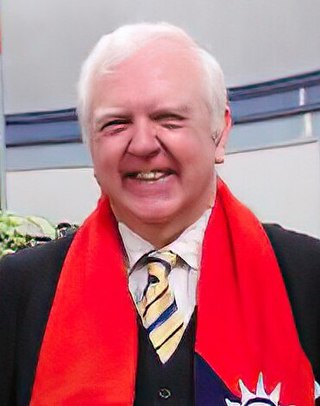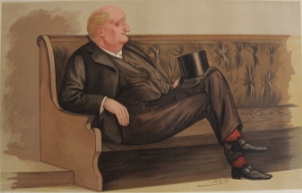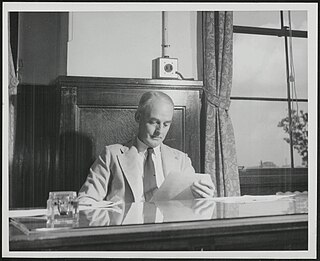Related Research Articles

William Douglas Cullen, Baron Cullen of Whitekirk is a former senior member of the Scottish judiciary. He formerly served as Lord Justice General and Lord President of the Court of Session, and was an additional Lord of Appeal in the House of Lords prior to the transfer of its judicial functions to the Supreme Court.

Michael Goodall Watson, Baron Watson of Invergowrie, is a British Labour Party politician. He has served in two legislatures in the United Kingdom and served as Minister for Culture and Sport in the Scottish Executive Cabinet, and a convicted criminal.

James Peter Hymers Mackay, Baron Mackay of Clashfern is a British lawyer. He served as Dean of the Faculty of Advocates, Lord Advocate, and Lord Chancellor (1987–1997). He is a former active member of the House of Lords, where he sat as a Conservative. He retired from the House on 22 July 2022.

The Crown Office and Procurator Fiscal Service is the independent public prosecution service for Scotland, and is a Ministerial Department of the Scottish Government. The department is headed by His Majesty's Lord Advocate, who under the Scottish legal system is responsible for prosecution, along with the sheriffdom procurators fiscal. In Scotland, virtually all prosecution of criminal offences is undertaken by the Crown. Private prosecutions are extremely rare.

The Faculty of Advocates is an independent body of lawyers who have been admitted to practise as advocates before the courts of Scotland, especially the Court of Session and the High Court of Justiciary. The Faculty of Advocates is a constituent part of the College of Justice and is based in Edinburgh.

Brian Gill, Lord Gill, KSG FRSE FRSAMD FRSCM is a retired Scottish judge and legal academic. Lord Gill was Lord President and Lord Justice General and held that position for three years from 2012 until 2015. His 2007 to 2009 consultation and report into the failings of the Scottish legal system was followed by a major overhaul of the entire court system once he had been appointed Lord President.

Andrew Rutherford Hardie, Baron Hardie, is a former Senator of the College of Justice, a judge of the Supreme Courts of Scotland, and a former Lord Advocate, the country's senior Law Officer. He led the prosecution team in the preparation of the original Lockerbie bombing trial, but resigned as Lord Advocate shortly before the trial commenced in 2000.
James Moncreiff, 1st Baron Moncreiff was a Scottish lawyer and politician.

Sir John Hay Athole Macdonald, Lord Kingsburgh, KCB, PC, PRSSA, FRS, FRSE was a Scottish Conservative Party politician and later a judge.

Robert Munro, 1st Baron Alness,, was a Scottish lawyer, judge and Liberal politician. He served as Secretary for Scotland between 1916 and 1922 in David Lloyd George's coalition government and as Lord Justice Clerk between 1922 and 1933.

Charles Scott Dickson, Lord Dickson, FRSE LLD was a Scottish Unionist politician and judge.
William Grant, Lord Grant, was a Scottish advocate, a Unionist politician, and a judge. Born to the Grant's distillery family who created Glenfiddich whisky, he was one of Scotland's Great Officers of State for the last 12 years of his life.
Thomas David King Murray, Lord Birnam,, known as Lord Murray between 1938 and 1941 and Sir David King Murray between 1941 and 1945, was a Scottish advocate and judge who served for two years as Unionist Member of Parliament (MP).
James John Clyde, Baron Clyde, PC was a Scottish judge.

Alan Charles Macpherson Johnston, PC was a Senator of the College of Justice in Scotland until his death in 2008 at the age of 66. He was appointed in 1994. He served as chairman of the Scottish Division of the Employment Appeal Tribunal from 1996 to 2005.

The School of Law at the University of Glasgow provides undergraduate and postgraduate courses in Law, and awards the degrees of Bachelor of Laws, Master of Laws, LLM by Research, Master of Research (MRes) and Doctor of Philosophy, the degree of Doctor of Laws being awarded generally only as an honorary degree.

William Donald Patrick, Lord Patrick, was a Scottish advocate who served with the Royal Flying Corps during World War I. After the war, he returned to practice law with great success, and became a judge in 1939, as a Senator of the College of Justice. After World War II, he was one of the 12 judges of the Tokyo War Crimes Trial at the end of the Second World War.
Events from the year 1966 in Scotland.

Joseph John Morrow, is the current Lord Lyon King of Arms. He was appointed on 17 January 2014 and, sworn of office on 27 February before the Lord President of the Court of Session, as Lord Lyon, Morrow took part in the Coronation of Charles III and Camilla in 2023.

The Scottish Sentencing Council is an advisory non-departmental public body in Scotland that produces sentencing guidelines for use in the High Court of Justiciary, sheriff courts and justice of the peace courts. Judges, sheriffs, and justices of the peace must use the guidelines to inform the sentence they pronounce against a convict, and they must give reasons for not following the guidelines.
References
- ↑ Robertson, Lynne (13 February 1997). "Lord Ross warns that judges should stay out of politics Unease over crime speech". The Herald. Retrieved 13 February 2011.
- ↑ "SHERIFFS (SCOTLAND)". Parliamentary Debates (Hansard) . 21 May 1974. Retrieved 19 October 2017.
- ↑ 'ROSS, Rt Hon. Lord', Who's Who 2017 , A & C Black, an imprint of Bloomsbury Publishing plc, 2017; online edn, Oxford University Press, 2016; online edn, Nov 2016 Retrieved 18 Oct 2017
- ↑ "Page 1621 | Issue 19991, 3 December 1976 | Edinburgh Gazette | the Gazette".
- ↑ "Hep' C victims 'should get cash'". BBC News. 6 November 2002. Retrieved 13 February 2011.
- ↑ "Heriot-Watt University Edinburgh: Honorary Graduates". www1.hw.ac.uk. Archived from the original on 18 April 2016. Retrieved 4 April 2016.
- ↑ "Football abuse victim claims he was trafficked from Scotland to paedophile Barry Bennell". Channel 4 News. 26 February 2020. Retrieved 27 February 2020.